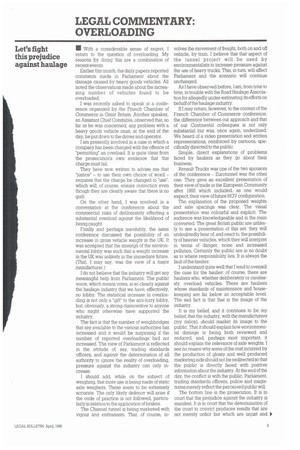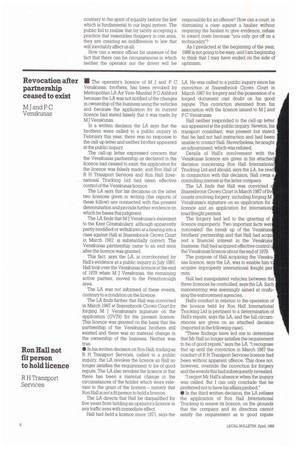Let's fight this prejudice against haulage
Page 7

Page 8

If you've noticed an error in this article please click here to report it so we can fix it.
• With a considerable sense of regret, I return to the question of overloading. My reasons for doing this are a combination of recent events.
Earlier this month, the daily papers reported comments made in Parliament about the damage caused by heavy goods vehicles. All noted the observations made about the increasing number of vehicles found to be overloaded I was recently asked to speak at a conference organised by the French Chamber of Commerce in Great Britain. Another speaker, an Assistant Chief Constable, observed that, so far as he was concerned, any problem with a heavy goods vehicle must, at the end of the day, be put down to the driver and operator.
I am presently involved in a case in which a company has been charged with the offence of "permitting" an overload. It is quite clear from the prosecution's own evidence that this charge must fail.
They have now written to advise me that justice' to use their own choice of word requires that the charge be changed to "use", which will, of course, ensure conviction even though they are clearly aware that there is no guilt.
On the other hand. I was involved in a conversation at the conference about the commercial risks of deliberately effecting a substantial overload against the likelihood of being caught.
Finally and perhaps inevitably, the same conference discussed the possibility of an increase in gross vehicle weight in the UK. It was accepted that the strentgh of the environmental lobby was such that a weight increase in the UK was unlikely in the immediate future. (That, I may say, was the view of a major manufacturer.) I do not believe that the industry will get any meaningful help from Parliament The public voice, which means votes, is so clearly against the haulage industry that we have, effectively, no lobby. The statistical increase in overloading is not only a "gift" to the anti-lorry lobby, but, obviously, a strong disincentive to anyone who might otherwise have supported the industry.
The fact is that the number of weighbridges that are available to the various authorities has increased and it would be surprising if the number of reported overloadings had not increased. The view of Parliament is reflected in the attitude of, say, trading standards officers, and against the determination of all authority to ignore the reality of overloading, pressure against the industry can only increase.
I should add, while on the subject of weighing, that more use is being made of static axle weighers. These seem to be extremely accurate. The only likely defence will arise if the code of practice is not followed, particularly in relation to the application of brakes.
The Channel tunnel is being marketed with vigour and enthusiasm. That, of course, in volves the movement of freight, both on and off vehicle, by train. I believe that that aspect of the tunnel project will be used by environmentalists to increase pressure against the use of heavy trucks. This, in turn, will affect Parliament and the scenario will continue unchanged.
As I have observed before, lam, from time to time, in trouble with the Road Haulage Association for allegedly under-estimating its efforts on behalf of the haulage industry.
If! may return, however, to the content of the French Chamber of Commerce conference, the difference between our approach and that of our Continental colleagues is not only substantial but was, once again, underlined.
We heard of a video presentation and written representations, reinforced by cartoons, specifically directed to the public.
Simple, direct explanations of problems faced by hauliers as they go about their business.
Renault Trucks was one of the two sponsors of the conference Eurotunnel was the other one. They gave an excellent presentation of their view of trade in the European Community after 1992 which included, as one would expect, their view of future HGV configuration.
The explanation of the proposed weights and axle spacings was clear. The visual presentation was colourful and explicit. The audience was knowledgeable and in the main converted. The great British public are unlike ly to see a presentation of this set: they will undoubtedly hear of, and react to, the possibility of heavier vehicles, which they will interpret in terms of danger, noise and increased pollution. Certainly the public are in no doubt as to where responsibility lies. It is always the fault of the haulier.
I understand quite well that I tend to oversell the case for the haulier: of course, there are hauliers who, whether deliberately or careles sly, overload vehicles. There are hauliers whose standards of maintenance and house keeping are far below an acceptable level. The sad fact is that that is the image of the industry.
It is my belief, and it continues to be my belief, that the industry, with the manufacturers (my italics), should market its image to the public. That it should explain how environmental damage is being both reviewed and reduced, and, perhaps most important, it should explain the relevance of axle weights. I see no reason why some of the cost incurred by the production of glossy and well produced marketing aids should not be redirected so that the public is directly faced with positive information about the industry. At the end of the day, the conflict is with the public. Parliament, trading standards officers, police and magistrates merely reflect the perceived public will.
The bottom line is the prosecution. It is in court that the prejudice against the industry is manifest It is in court that the determination of the court to convict produces results that are not merely unfair but which are unjust and ■
contrary to the spirit of equality before the law which is fundamental to our legal system. The public fail to realise that by tacitly accepting a practice that resembles thuggery in one area, they are creating an indifference to law that will inevitably affect us all.
How can a senior officer be unaware of the fact that there can be circumstances in which neither the operator nor the driver will be responsible for an offence? How can a court, in dismissing a case against a haulier without requiring the haulier to give evidence, refuse to award costs because you only got off on a technicality"?
As I predicted at the beginning of the year, 1988 is not going to be easy, and 1 am beginning to think that I may have ended on the side of optimism.
















































































































